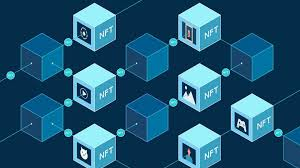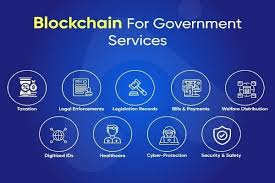Now Reading: “How Dubai Is Revolutionizing Public Services Using Blockchain Technology 2025!”
-
01
“How Dubai Is Revolutionizing Public Services Using Blockchain Technology 2025!”
“How Dubai Is Revolutionizing Public Services Using Blockchain Technology 2025!”

Table of Contents
In the fast-changing world of digital innovation, Dubai stands out as a leader in using blockchain technology to transform public governance. With a bold vision to become the first city fully powered by blockchain, Dubai is setting new global standards for transparency, efficiency, and trust in government services.
But what exactly is blockchain, and why is Dubai investing so heavily in this futuristic technology? More importantly, what could this mean for the everyday life of citizens and businesses? Let’s explore Dubai’s vision and its potential to change how governments worldwide could work in the future.
What is Blockchain Technology?

Before diving into Dubai’s strategy, it’s important to understand the basics. Blockchain is a secure digital ledger that records transactions across many computers. This makes it impossible to alter or delete records without leaving clear proof of the change.
In simple words, blockchain helps store information in a way that is safe, transparent, and trusted by all parties involved. This technology is most famous for powering cryptocurrencies like Bitcoin, but its use goes far beyond digital money.
For governments, blockchain offers exciting possibilities:
- No more paperwork.
- Instant record verification.
- Less chance of fraud.
- Faster, easier, and more reliable services for the public.
Dubai’s Ambitious Blockchain Strategy

Dubai aims to become the world’s first city to fully run its public services on blockchain by 2030. This grand plan falls under the Dubai Blockchain Strategy, launched by Smart Dubai in partnership with the Dubai Future Foundation.
The vision has three main goals:
- Government Efficiency:
By using blockchain, Dubai plans to move 100% of government documents, such as visa applications, license renewals, and bill payments, onto secure digital platforms. This could save 25 million hours of labor annually, along with billions of dirhams spent on processing paper documents. - Industry Creation:
Dubai’s leadership believes that blockchain can spark new industries worth billions of dollars. Sectors such as finance, health, real estate, and tourism could benefit hugely by reducing costs, improving safety, and building public trust. - Global Leadership:
Dubai wants to share its experience with the world and become a global center for blockchain-based innovation. The city hopes to attract top talent, investors, and companies to create a lively digital economy.
Examples of Blockchain in Dubai’s Public Services
Dubai’s blockchain journey is not just talk; real projects are already happening. Here are a few examples:
- Dubai Land Department (DLD):
The DLD is using blockchain to simplify property transactions. All records of ownership, sale, and rental agreements are being securely stored and shared in real time. This reduces fraud and speeds up the process for buyers and sellers. - Digital Passports:
Dubai International Airport has tested a “digital passport” system that allows passengers to move through security checkpoints faster. Blockchain stores the traveler’s data safely, allowing for smooth, paper-free travel. - Health Records:
Dubai’s healthcare sector is working to create a single, blockchain-based system for patient records. This gives doctors instant access to reliable information while keeping personal data private and safe.
Benefits of Blockchain-Based Governance
Dubai’s blockchain plan could offer many advantages for both the government and the public:
- Transparency:
Every transaction on the blockchain is visible and cannot be changed secretly, reducing corruption and mistakes. - Security:
Data stored on blockchain is nearly impossible to hack or lose. - Cost Savings:
Less paperwork and faster processing save time and money. - Public Trust:
People are more likely to trust government systems that are open and clear. - Business Growth:
A blockchain-friendly environment attracts tech startups, investors, and global companies.
Challenges and Concerns
Of course, the path to a blockchain-powered government is not easy. Dubai faces several challenges:
- High Costs of Setup:
Building a full blockchain system for an entire city is expensive and complex. - Technology Skills Gap:
There is a shortage of experts who understand blockchain deeply. - Regulation Issues:
Laws and policies must be updated to fit the new technology. - Privacy Worries:
Even though blockchain is secure, people worry about how their personal data will be used and who can see it.
Dubai’s government is aware of these challenges and is working with technology experts, legal advisors, and private companies to solve them.
A Global Example for the Future?
Many countries are watching Dubai’s blockchain experiments closely. If the city succeeds, it could inspire other governments worldwide to follow this model. Countries like Estonia and Singapore are already exploring similar paths but on a smaller scale.
Dubai’s push into blockchain-based governance could become a blueprint for future cities—where public services are fast, transparent, and safe for all.
Final Thoughts
Dubai’s vision of blockchain-powered governance is bold and exciting. It promises to make public services simpler, safer, and more reliable than ever before. While challenges remain, the progress so far shows that this dream is turning into reality step by step.
In a few years, we might see cities across the world adopting Dubai’s model, proving that blockchain is not just a buzzword but a true tool for better government services.
Read More:- Shobha Realty Launches Its Most Luxurious Project Yet—Full Details Inside 2025



















